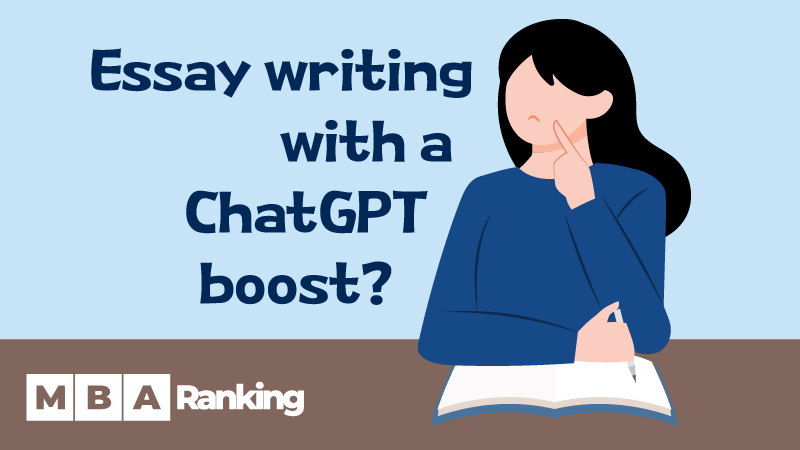Are there MBA schools w/ ChatGPT applications in curriculum?

Earlier this year, we have witnessed one of the greatest hypes for generative AI modules to business. In the core of the tide, there was ChatGPT that fascinated average internet users, which simply is an upgraded version of Google Search. Now the hype is not as strong as it was, but people are now wondering how to leverage the platform to our daily life. Some MBA schools are ready to answer those needs.
MBA schools teach ChatGPT applications
Many MBA programs recognize the growing importance of artificial intelligence (AI) and its applications in business. As a result, they have started incorporating AI-related topics into their curriculum. While the depth and extent of AI education may vary among different programs, there are several ways in which MBA schools teach AI applications:
- Elective Courses: Some MBA programs offer elective courses specifically focused on AI applications in business. These courses cover topics such as machine learning, data analytics, natural language processing, predictive modeling, and AI strategy.
- Specializations or Concentrations: Certain MBA programs offer specializations or concentrations in technology management, data analytics, or digital transformation. These tracks often include coursework related to AI applications, helping students understand how AI can be leveraged to drive innovation, enhance decision-making, and improve business processes.
- Integrated AI Topics: Even if a specific course solely dedicated to AI is not offered, many MBA programs integrate AI topics into various core courses. For example, marketing courses might cover AI-powered customer segmentation or personalized recommendations, while operations courses might discuss AI applications for process optimization or supply chain management.
- Case Studies and Projects: MBA programs frequently use case studies and hands-on projects as part of their curriculum. These can include real-world examples of AI implementation, allowing students to analyze business challenges, evaluate AI strategies, and propose solutions.
- Guest Lectures and Industry Experts: MBA programs often invite guest speakers from the industry to provide insights on AI applications. These experts can share their experiences, discuss trends, and offer perspectives on how AI is transforming businesses in different sectors.
It’s important to note that the specific AI offerings may vary among MBA programs, so it’s recommended to research individual programs to determine the extent of AI education they provide.
What can you learn from MBA schools for ChatGPT applications?
MBA schools can provide valuable knowledge and skills that can be applied to ChatGPT applications in various ways. Here are some areas in which MBA programs can be beneficial:
- Business Strategy: MBA programs typically emphasize business strategy, which can help you understand how to effectively integrate ChatGPT or conversational AI into overall business objectives. You can learn how to identify market opportunities, assess competitive landscapes, develop implementation plans, and evaluate the potential impact of ChatGPT on different business functions.
- Marketing and Customer Experience: MBA courses in marketing can provide insights into leveraging ChatGPT to enhance customer experience. You can learn how to use conversational AI to personalize customer interactions, provide tailored recommendations, improve customer support, and design effective marketing campaigns using ChatGPT as a communication channel.
- Data Analytics: Many MBA programs cover data analytics, which is crucial for understanding and applying ChatGPT effectively. You can learn about data collection, analysis, and interpretation to make informed decisions regarding ChatGPT applications. This knowledge will help you understand the data requirements, ethical considerations, and limitations of using ChatGPT in different business contexts.
- Ethical and Legal Considerations: MBA programs often emphasize ethics and legal frameworks, which can be crucial for ChatGPT applications. You can learn about the ethical implications of AI, including issues related to bias, privacy, and transparency. Understanding legal considerations, such as data protection regulations and intellectual property rights, is also important when implementing ChatGPT in business settings.
- Project Management: MBA programs typically cover project management methodologies, which can be helpful for planning and executing ChatGPT implementation projects. You can learn how to manage resources, set realistic goals, define project timelines, and monitor progress when incorporating ChatGPT into business operations.
- Entrepreneurship and Innovation: MBA programs often foster an entrepreneurial mindset and encourage innovation. This can help you explore new business models, identify novel applications of ChatGPT, and develop strategies for introducing ChatGPT-powered products or services to the market.
It’s important to note that while MBA programs can provide a solid foundation, technical skills in natural language processing (NLP) and AI programming may require additional specialized training or self-study to fully leverage ChatGPT in practice.
Do you need to know details of NLP?
To effectively work with and utilize ChatGPT or other natural language processing (NLP) models, having a foundational understanding of NLP concepts can be highly beneficial. While you don’t need to be an expert in the technical details of NLP, having a grasp of the fundamental concepts can help you make better decisions and effectively leverage NLP models like ChatGPT. Here are some key areas to consider:
- NLP Basics: Familiarize yourself with the basic concepts of NLP, such as tokenization, part-of-speech tagging, named entity recognition, syntactic parsing, and semantic analysis. Understanding these concepts will give you a better understanding of how NLP models process and understand language.
- Text Preprocessing: Gain knowledge about common text preprocessing techniques in NLP, including cleaning and normalizing text data, handling stop words, stemming or lemmatization, and dealing with text encoding. Preprocessing is crucial for preparing input data for NLP models.
- NLP Tasks and Techniques: Explore different NLP tasks and techniques, such as sentiment analysis, topic modeling, text classification, sequence labeling, and language generation. Understanding these tasks will help you identify relevant applications for ChatGPT and other NLP models.
- Evaluation Metrics: Learn about evaluation metrics commonly used in NLP, such as accuracy, precision, recall, F1 score, and perplexity. Understanding how to assess and measure the performance of NLP models is essential for evaluating and fine-tuning their output.
- Limitations and Biases: Familiarize yourself with the limitations and biases that can arise in NLP models. NLP models like ChatGPT can exhibit biases present in the training data, so understanding these issues and working to mitigate them is important.
While you may not need to have an in-depth technical understanding of the intricacies of NLP algorithms, having a solid understanding of the fundamental concepts and techniques will enable you to make informed decisions when using NLP models like ChatGPT, interpret their outputs, and engage in discussions about NLP-related topics.







